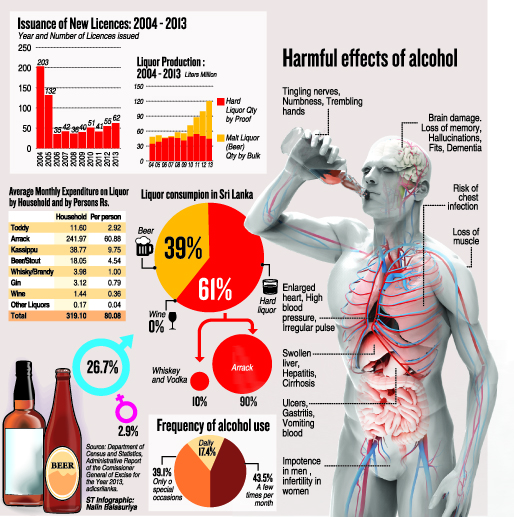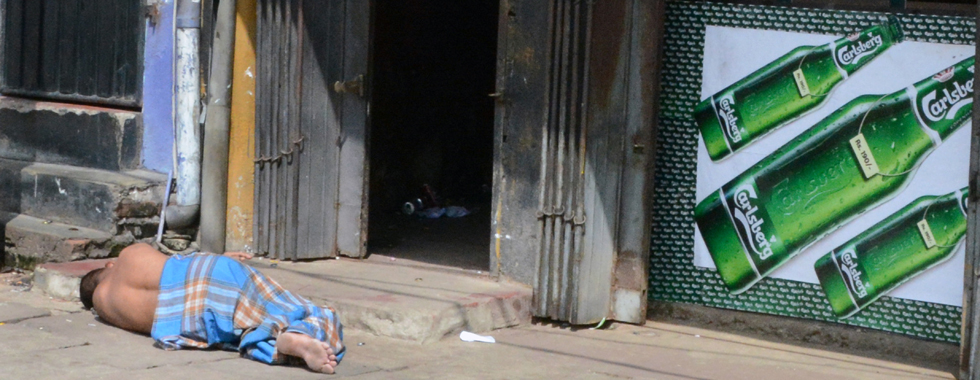News
“Cheers to Mathata Thitha”, says Govt. and the people drink to that
P.M. Piyadasa says he began drinking when he was about 17. Today, at 63, he is unable to stop his descent into alcoholism. He had grown up in a home where he and his two brothers witnessed the daily ritual of their father coming home drunk in the evening, quarrelling with their mother and verbally and physically abusing her, as well as the sons. Hailing from the Piliyandala area, it seemed natural for him to start consuming alcohol as soon as he began earning, from masonry work. It was a habit he developed early and unable to break even after 40 years. Married with two children of his own, he repeats the lifestyle pattern of his father. Price increases have done little to deter him from taking his daily dose of alcohol, and hasn’t given a second thought to the Government’s much hyped “mathata thitha” programme introduced in 2006, aimed at  discouraging the increasing consumption of alcohol in the country.
discouraging the increasing consumption of alcohol in the country.
In fact, the much publicised programme had little impact within society since its introduction eight years ago, mainly due to lack of commitment on the part of the Government, as well as the duplicity in its anti – alcohol policies, with the massive revenue the State collects from sales, taking precedence over its half-hearted attempts to discourage the widespread habit of alcohol consumption.
While consumption continues to increase, the Excise Department in its annual report for 2013 says that Rs 66,008 million was collected as Excise duty that year, which is an increase of 10% compared with 2012.
“Mathata thitha” is just a slogan. The Government does not have a pragmatic approach to moderate the drinking habits of the people. What is in place is a much publicised ad hoc announcement, with neither proper financial allocations nor a programme of action to implement it,” G.D. Dayaratne, a senior researcher at the Institute of Policy Studies (IPS) in Colombo told the Sunday Times.
Mr. Dayaratne who has done a study on ‘The State of Sri Lanka’s Alcohol Industry & Analysis of Governing Policies’, which was published by the IPS in its Research Studies Working Paper Series in December 2013, said that, starting from the highest levels in the administration, to ministries, to departments and other government institutions, serving alcohol at official functions is routine, and this itself is evident that the “mathata thitha” programme is something that was trumpeted to please a constituent Party in the ruling alliance, and in no way meant to seriously tackle the issue of alcoholism in the country.
“At a recent official function for employees of a State bank, one of the gifts given to the participants was an a bottle of arrack priced at around Rs 1,000. During election campaigns, alcohol is distributed freely. The rule that liquor stalls should not be located in close proximity to places of religious worship and schools is openly flouted. If the Government is serious about discouraging the use of alcohol, at least, it can prohibit alcohol use at official functions, restrict the types of liquor they serve and stop issuing new licences,” he said.
The duplicity in the Government’s anti-alcohol drive is clearly visible, going by the statistics in the Excise Commissioner’s latest report. Between 2004 and 2013, a total of 697 new liquor licences were issued, even though the number has come down to 203 in 2004 and 62 in 2013.

One too many: A man fallen in front of a tavern. Pic by Nissanka Meegoda
The Department says its present Excise policy is based on the “Mahinda Chinthanaya” and, in line with this, its takes necessary action to control the consumption of liquor and the use of cigarettes. To curtail the consumption of liquor, taxes have been increased several times, and issuance of new liquor licences restricted only to institutions approved by the Sri Lanka Tourism Development Authority.
In 2013, there were a total of 2,921 Excise licensees operating across the country, of which, the largest number was in the Colombo District- 608, Gampaha- 399, Kandy- 199, Galle- 197, and Nuwara Eliya- 196. However, more than treble this number are believed to be operating without licences, manufacturing and selling illicit liquor across the country.
“The elimination of the supply of illicit alcohol could become effective only when the nexus between illicit brewers, politicians, police and Excise department officials is removed. The existing political culture with the Proportional Representation system has provided the best boost for illicit and illegal alcohol producers to establish strong links with politicians,” noted Mr Dayaratne in his research.
He also found that, within Sri Lankan society, those more susceptible to alcohol addiction include the low income and unemployed, and partially employed rural and urban working population.
The Excise Department said that, in 2013, hard liquor production showed a decrease of 11%, compared with 2012, while soft liquor (beer) production showed an increase of 21% over 2012. Mr. Dayaratne said that the increase in beer production can be attributed to the fact that many new consumers of alcohol start with beer, and hence, its production and sales have been rising steadily over the past few years.
Mr. Dayaratne says, given that drinking customs and habits are deeply rooted in the multiethnic culture in Sri Lanka, effective action to prevent or reduce the harm caused by alcohol will require the development and application of evidence based recommendations and strong political commitment, not just ad hoc polices.

